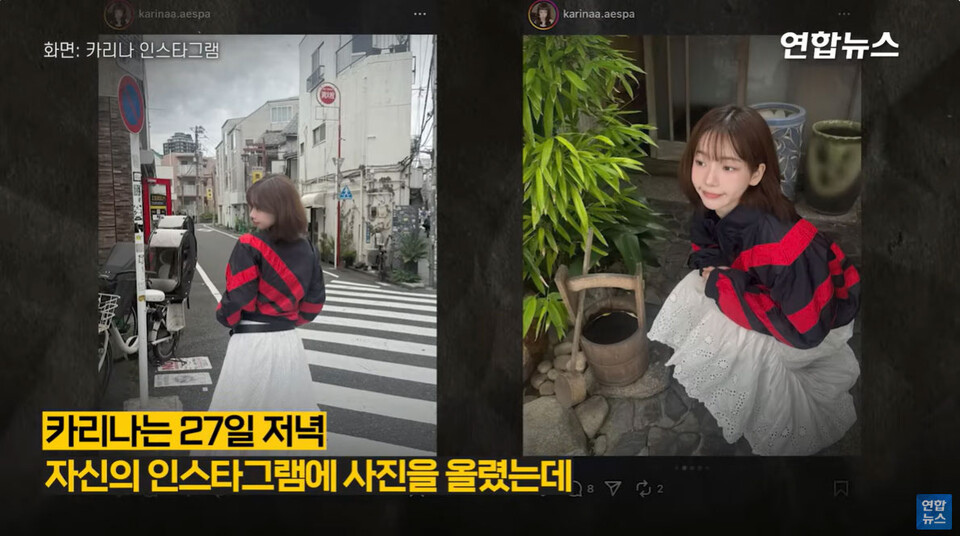As the presidential election season approached its climax, its fervor spilled over into the K-pop scene. Karina, a member of aespa, posted a photo on Instagram wearing a red jacket with the number 2 on it. It was interpreted as a message of support for Kim Moon-soo, the People Power Party candidate, whose symbolic color is red and ballot number is 2. The comment section was flooded with criticism: Why would you post a photo that could cause misunderstandings during such a politically sensitive time? Why is an idol expressing political views? Why are you supporting the party of an impeached president? The photo was deleted two hours later. Karina and SM Entertainment explained that the photo had no political intention whatsoever.
Let’s be clear: this is an overreaction. People went so far as to not only speculate but also make definitive judgments based on a photo with no text. Still, from a realistic perspective, it’s true that a context prone to misunderstanding has built up. As social media has become more widespread, celebrities have begun speaking out more on social issues. During the 2012 presidential election, the first major election after smartphones became widespread, it became trendy for celebrities to post “I voted” selfies, which then sparked controversy. In one case, someone posed with a V sign in front of a polling station, and it was considered a violation of election law for resembling a specific party’s number. Since then, every election season has seen a kind of visual scavenger hunt: what color someone wore at a polling place, what pose they struck, all scrutinized for hidden political meaning.

Still, one thing is clear: once the person involved has clarified their intentions, that explanation should be accepted. Continuing the controversy only serves to impose a political label on Karina and to use a minor incident to tarnish her image. It was inappropriate for figures from the People Power Party to repost Karina’s photo and leave comments framing it as a show of “courage” or support. They ignored her stated intent and treated a popular idol as if she had publicly endorsed them, effectively hijacking her image for their campaign. This amounts to unauthorized use for political purposes.

Even in the United States, a country known for freedom of expression, political statements by celebrities often provoke backlash. From a management perspective, staying silent is the safest route. Top pop star Taylor Swift has said that when she debuted, her record label advised her not to speak about politics. Nonetheless, she publicly voiced her support for the Democratic Party in the 2018 US midterm elections, as well as the 2020 and 2024 presidential elections. In two-party systems like those of Korea and the US, supporting one party often means alienating the half of the population that supports the other. Swift has faced criticism from Republicans but has not backed down from her stance.
If in Korea, a celebrity's political position tends to be suppressed altogether, in the U.S., expression happens in the idealized form of freedom of speech coexisting with criticism.
Let’s ask a fundamental question: regardless of the practical realities, why is it treated as a wrongdoing for celebrities in Korea to have political opinions? It stems from public opinion that labels them as "public figures" and warns them not to wield their influence irresponsibly. They are expected to maintain political neutrality, almost like civil servants. Of course, it's true that more celebrities have begun to express partisan views compared to the past but most of them operate outside mainstream media. Celebrities with major fame, like idols, still remain confined within the boundaries of the old era.

From an industry perspective, the imbalance within the K-pop agency system plays a role. A few members of a group who act as cash cows carry the company’s revenue and reputation on their shoulders, so their words and actions become direct risks for a company worth hundreds of billions of won. To protect the group from controversy, fandoms often rush to defend the idols, even when their remarks could be open to interpretation, claiming it's just an “overinterpretation” and stripping the statements of meaning. Idol self-expression is effectively censored by both internal and external pressures within the system.
This controversy is a case where a particular form of social repression centered on the figure of the idol was activated in Korean society. If public backlash is the visible surface, beneath it lies the agency’s responsibility and deeper still, the underlying code of repression. That code is an issue that everyone who makes up society needs to reflect on. It should not be dismissed by simply blaming the individual idol. A freer society would be one where—even if Karina literally did support the People Power Party, it would not be treated as a sin, even if it sparked debate. The democratic spirit symbolized by the presidential election is, at its core, about recognizing and respecting the expression of every citizen’s sovereignty as it is.


![[instiz] I SAW THIS AND I CARE ABOUT MINA SUE, HA..](https://blogger.googleusercontent.com/img/a/AVvXsEgLICkLfuSjOf_olc_vu7JS0BKMNgXgE1QxCN_KCIzWyBpVzmLU7o3fDmziylryhNvj0WqrwcXPY9_kYE3KBf48VZuCgE23P_5jRUOXg9Fuwo-3PrKxZnHrxfwSsY6vG9K9AHGCyKOjyKwiKa6ssEwg5uiHzhFLPmErUdKXIEcdE4BTQ3G5SaN6SULKrp_4=w72-h72-p-k-no-nu)
![[instiz] THESE ARE THE CELEBRITIES THAT GET MENTIONED THE MOST AS PLASTIC SURGERY REFERENCE](https://blogger.googleusercontent.com/img/a/AVvXsEiGxw9t2e2obpeRdzx_QTd0yxSWVcMyIs3CezJvV-iFMlW9aI3svFGVyIUMt5YncZUs809cb_wF-pXh4ANrJjU8VhHE4GOPbLHoPX2nFEpTKW2UnEJ04qmBwb_hby_uzgrqhkouYOlzLEawq3ZpkTF7DGc9IQWiAOovy29p4qFc7E9k1kLmN6SGFMaPzEbd=w72-h72-p-k-no-nu)
![[theqoo] THE KATSEYE MEMBERS' LOVERS](https://blogger.googleusercontent.com/img/a/AVvXsEglCm3rq-AZJAfiu6pRjQFVmuI6zlX-9rf5-7G6lIK8wwEB_YN_T6dim2wj0N5o0BkKVxGJim_LK1OcAReG6Mlu3OXrd9WqJS59fZBlLuNTpVx-TlDOJ6UJGpNR2AGFXgMOQvHj1EvV0Bq62nNxzTytDpVmmcYWc8ZH_rYpuF1rWDA3_P6AjJUG9V27u--Y=w72-h72-p-k-no-nu)
![[enter-talk] CHOI MINA SUE'S OLD PHOTOS](https://blogger.googleusercontent.com/img/a/AVvXsEjeMUvr4PPwcDU2Qu9vkW1hRFMlBmakTWUjy7MAXi7tHn0Ha2Bw9w_b634Yp9LB_x_b3-SwR5kYNu4ofSI6zuPr0HHMVcsVwIQPiUMq_V2cbrLnEHDJobNj-82rqVg865OAVheyieSJHMHQ_wHARyFBz_Oi7KG-VJOxTTDM1IRtqSAsdh_i7EKBh6V5yFQu=w72-h72-p-k-no-nu)
![[instiz] WINTER WORE THE SAME CLASSES AS JUNGKOOK TODAY](https://blogger.googleusercontent.com/img/a/AVvXsEhnt3EBTbaHpY3HvGvwOBLTZ9U1RhOblsPxwhTA0W4ygAGVFumpZacBOpP4ZfGIACs7iEILGOqko9V5Or9RudzVdS3ao2My2rs4CSZD_DYUANXFKWgKHvNtmHiHSP6Iv9jPB3Co_mXmEx38dVvcLqREGf5VPm82evkVMd0Zlg5ytrNyZtLJZYF_AWz5eJrM=w72-h72-p-k-no-nu)
0 Comments